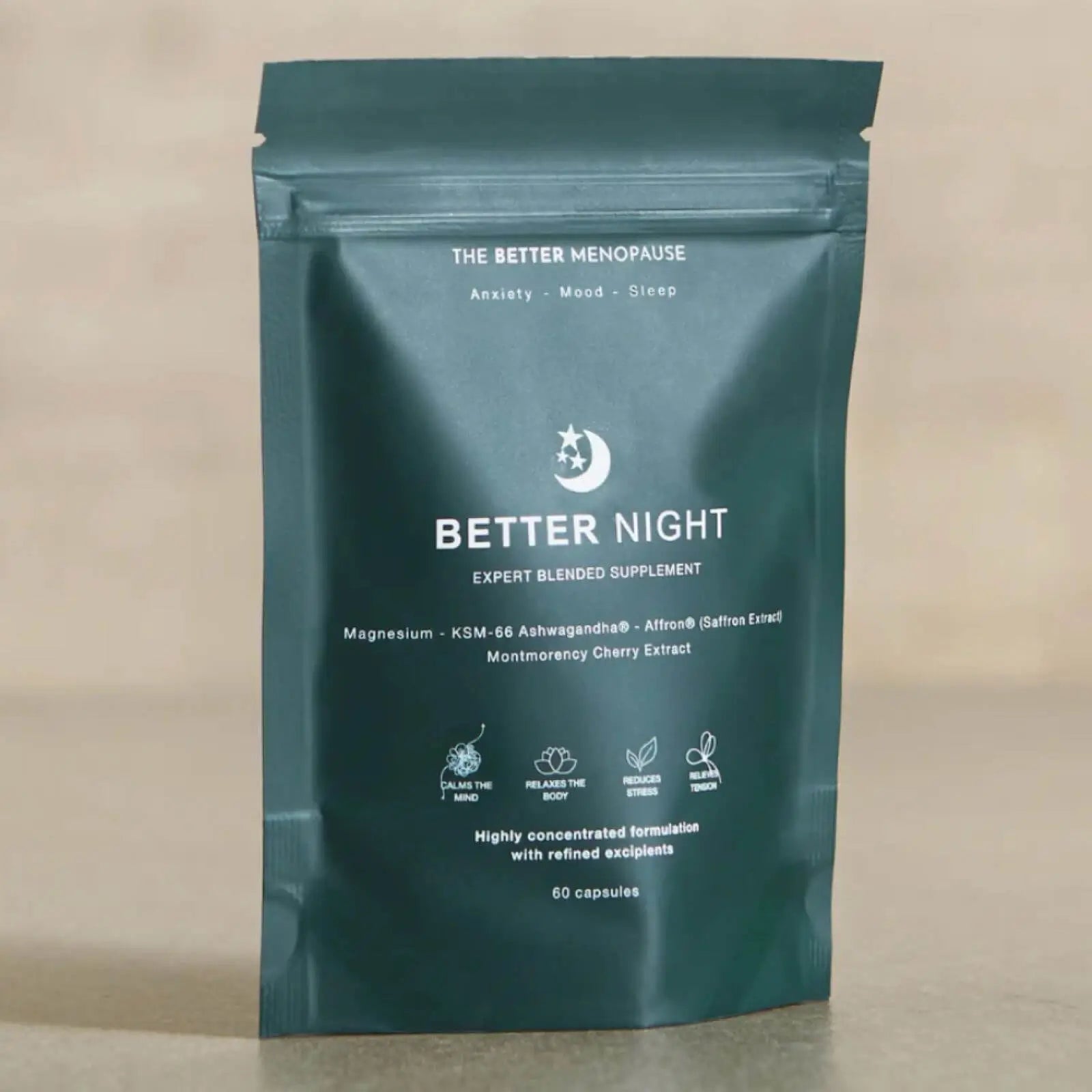
Why your body odour could change during menopause, and what you can do about it
Exploring the hormone changes and other factors that can affect body odour during perimenopause and menopause and what you can do to manage it.
Changes or increases in body odour can be symptoms of perimenopause and menopause. Shifting hormone levels, increased sweating, hot flushes and stress or anxiety can all be contributing factors. It’s even possible that it’s your sense of smell, rather than your body odour, that has changed.
We’ll examine all this in more detail below, as well as exploring what menopause body odour can smell like and the different ways to treat it. We’ll also look at the best deodorants for combatting body odour, including those you can get on prescription.
The specially chosen strains of friendly bacteria in The Better Gut probiotic supplements can help reduce both the hot flushes and stress that can lead to increased sweating and body odour.
Find out more at The Better Gut. And get 10% off your first order with the discount code WELCOME10.
What causes menopause body odour?
You have two main types of sweat glands around your body. Eccrine glands are found in particular on the palms of your hands and the soles of your feet, as well as on your torso, limbs and face. They produce sweat that’s mostly water. It helps you to cool down and doesn’t have much smell.
Apocrine glands – in your armpits, between your legs and on your breasts and face – produce a thicker kind of sweat containing fats, proteins, sugars and the pungent chemical compound ammonia.
Apocrine sweat provides food for bacteria, which break it down, creating smells. This kind of sweat is the main cause of body odour.
Excessive sweating – also known as hyperhidrosis – can be a symptom of perimenopause and menopause. A number of other factors can also influence how much sweat you produce and how it smells.
Hormone changes
During perimenopause – the years before you reach menopause – your levels of the reproductive hormone oestrogen fluctuate. Following menopause – 12 months after your last period – they settle at their lowest point.
Less oestrogen means a higher proportion of another hormone, testosterone, in your sweat. This can attract more bacteria, leading to increased body odour.
Hot flushes
Hot flushes are one of the most common symptoms of perimenopause and menopause. These sudden sensations of heat can lead to increased sweating.
As you go through the menopause transition, you may also find that you start to sweat more in general, and at lower temperatures.
In both cases, more sweating can equal stronger body odour.
Stress and anxiety
Increased stress and anxiety are also common symptoms of perimenopause and menopause, and both can make you sweat.
What’s more, ‘stress sweat’ is produced by your apocrine glands, such as those under your arms, so is exactly the kind that’s likely to cause body odour.
Changes to your sense of smell
Oestrogen and another reproductive hormone, progesterone, play a role in your sense of smell. Changing levels during menopause can make things smell different. You may also experience odours – often unpleasant ones – that aren’t really there.
So it’s possible that what seems like a change to your body odour is actually a change to your sense of smell and not something other people will be aware of.
What does menopause body odour smell like?
Everyone’s physiology is different and changes to body odour during menopause are likely to vary from person to person. However, many women notice that their sweat smells stronger.
Others report that their scent has actually changed to something they don’t recognise as their own. This may be due to changes in the balance of hormones in the sweat, such as a higher proportion of testosterone to oestrogen, as touched on above.
Some women describe their menopause body odour as smelling like urine, and even cat pee, which could be caused by excess ammonia due to increased amounts of apocrine sweat.
Aside from body odour, you may also experience ‘phantom smells’, such as smoke.
How to treat menopause body odour
There are a number of treatments, supplements and lifestyle changes that may help with menopause body odour, either by reducing sweating or making sweat smell less strong.
Along with the options below, it’s of course important to wash regularly and, where possible, try to keep cool – for instance, by choosing loose clothing made from natural fibres like cotton, rather than synthetics.
Hormone replacement therapy
Hormone replacement therapy (HRT) is a prescription treatment that helps with many of the more common symptoms of menopause by replenishing your levels of oestrogen and other reproductive hormones.
HRT is generally very effective at improving hot flushes and night sweats, and can also reduce anxiety. So if your menopause body odour is caused by increased sweating due to these symptoms, there’s a good chance HRT could help.
HRT can be taken as tablets or through your skin via gels or patches. Your doctor will talk to you about which form of HRT might be best for you.
Probiotic supplements
Probiotics are friendly bacteria that can have a variety of different health benefits around your body via your gut. Specific strains of probiotics can help with hot flushes and other symptoms that lead to menopause body odour.
The Better Gut probiotic supplements contain five strains of bacteria that have been shown in studies to reduce the frequency and severity of hot flushes and night sweats. Some of these can also improve symptoms of anxiety, another potential cause of smelly sweat.
To find out more, visit The Better Gut. And get 10% off your first order with the discount code WELCOME10.
Managing stress and anxiety
If stress sweating due to increased anxiety is contributing to your menopause body odour, there are things you can do to help manage this, along with the treatments we’ve already looked at:
- Cognitive behavioural therapy (CBT): This talking therapy that has been shown to reduce anxiety in menopausal women. In the UK, your doctor can refer you to a CBT specialist or you can find one via this NHS tool.
- Mindfulness: Studies have shown that mindfulness practices like meditation, yoga and breathing exercises can be an effective way to reduce anxiety during menopause. They can also lower your levels of the stress hormone cortisol.
- Ashwagandha: Taking a daily supplement containing this traditional Ayurvedic medicine may increase circulating oestrogen and has been shown to reduce both anxiety and cortisol levels.
- Magnesium: Magnesium plays an important role in your body’s response to stress. Like ashwagandha, magnesium supplements can lower cortisol levels and reduce anxiety.
For more tips on reducing anxiety during menopause, read our dedicated article.
Identifying problem foods
Certain foods and drinks can trigger sweating. For many people, these include alcohol, hot spices, garlic and onions. All of these, as well as several other foods and drinks, can also make your sweat smell.
Your body turns alcohol into acetic acid – the equivalent of vinegar – which can be released through your sweat glands as well as on your breath.
Red meat secretes proteins into your sweat that can smell when they come into contact with bacteria.
Cruciferous vegetables, or brassicas, like broccoli, cabbage and cauliflower, release sulphuric acid, which can sometimes smell like eggs.
However, these vegetables are healthy foods that you wouldn’t want to leave out of your diet unnecessarily. If you think what you’re eating could be contributing to your body odour, it might be a good idea to keep a food diary and see whether the smell is linked to particular foods.
What are the best deodorants for menopause body odour?
Before deciding on a deodorant to tackle your menopause body odour, it’s important to be aware that not all deodorants are antiperspirants.
While antiperspirant deodorants help to reduce sweating, and thereby the bacteria that produce body odour, others only cover the smell with a perfumed scent.
Some deodorants of both kinds also contain antibacterial agents, which is an extra way to help reduce odour-producing bacteria.
If excessive sweating is causing your body odour, you should definitely choose an antiperspirant. If ordinary antiperspirants are not doing the job, your pharmacist can recommend stronger kinds, or your doctor may prescribe one.
These stronger antiperspirants generally contain high levels of aluminium chloride, which helps block your sweat glands. They include the roll-ons Anhydrol Forte and Driclor and the spray Odaban.
Your doctor or pharmacist can explain the best way to use these products and how to reduce the skin irritation they sometimes cause.
When to talk to a doctor about body odour
Along with menopause, changes to your body odour can be caused by some medical conditions, including diabetes, kidney disease and liver disease.
These changes may also be the results of taking certain drugs, such as antidepressants. But you shouldn’t stop taking prescribed medication without talking to your doctor first.
The NHS recommends seeing a doctor about body odour if:
- it’s affecting your confidence
- there’s a change to how your body odour smells
- you suddenly start to sweat more than usual
If you’re experiencing excessive sweating, see a doctor if:
- it’s lasted for more than 6 months
- you get it once a week or more
- it’s preventing you from getting on with your day to day life
- it happens at night
- it runs in your family
- you’re taking medication for another condition
Summary
Apocrine sweat glands, in your armpits and elsewhere, produce sweat containing proteins, fats, sugar and ammonia. When bacteria metabolise these, it can cause body odour.
Hormone changes can make this worse, while sweating more, hot flashes and stress can also contribute to changing or increased body odour.
Some women describe menopause body odour as stronger than usual, different or as smelling like urine.
HRT, probiotic supplements, managing stress and cutting out certain foods could all help to tackle some of the causes of menopause body odour. Antiperspirant deodorants containing high levels of aluminium chloride can also be an effective solution.
The Better Gut probiotic supplements can reduce the hot flashes, anxiety and stress that may contribute to menopause body odour, as well as a range of other perimenopause and menopause symptoms.
Use the discount code WELCOME10 to get 10% off your first order.


